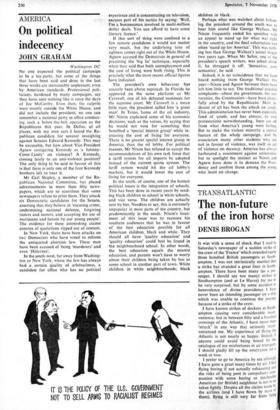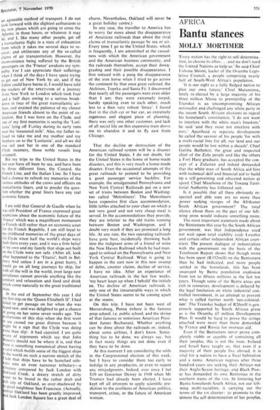TRANSATLANTIC
The non-future of the iron horse
DENTS BROGAN
It was with a sense of shock that I read in Saturday's newspaper of a sudden strike of the crew of the 'France' which stranded nearly three hundred British passengers at South- ampton. I was not intrinsically startled that a strike has stranded a great liner in South- ampton. There have been many (as a pas- senger, I should say too many) strikes at Southampton (and at Le Havre) for me to be very surprised, but by some accident or benevolence of divine providence I have never been an intending passenger on a ship which was unable to continue the journey because of a strike of the crew.
I have known strikes of dockers at South- ampton causing very considerable incon- venience, but in between fifty and a hundred crossings of the Atlantic, I have never been 'struck' in any way that seriously incon- venienced me. My experience of flying the Atlantic is not nearly so happy. Indeed, if anyone could avoid being bored by the catalogue of my misfortunes in air transport, I should gladly fill up the SPECTATOR for a week or two. I prefer to go to America by sea although I have gone a great many times by air. I find flying boring if not actually exhausting and the risks of being pent in compulsory com- munion with some boring or intolerable American (or British) neighbour is not to be taken lightly. Despite all the claims made bY the airlines (and I have flown by most Of them), flying is still very far from being an agreeable method of transport. I do not look forward with the slightest enthusiasm to the new planes which are going to cross the Atlantic in three hours, or whatever it may he and I, like many other people, get off a transatlantic flight in a state of exhaustion from which it takes me several days to re- cover, and obliterates any of the so-called claims of air transportation. However, the inconvenience being suffered by the British passengers on the `France' awakens my sym- pathy. For I can appreciate their sufferings when I think of the days I have spent trying to get out of New York by air, and if the Editor could have borne it, I would have told the readers of the SPECTATOR of a journey from New York to London which took four and a half days owing to a serious break- down in four of the great transatlantic air- lines, and strained the patience of my closest American friends almost to the point of ex- tinction. But I was born on the Clyde, and one of my first memories is seeing the `Lusi- tania' lying off Farley during its early runs over the 'measured mile'. Alas, my father re- fused to take me and my mother and my brothers on to the `Lusitania', and all we did was sail past her in one of the standard Clyde steamers, those noble vessels long scrapped.
But my trips to the United States in the last year have all been by sea, and have been by three different lines, the Cunard, the French Line, and the Italian Line. So I have had a chance to refresh my memories of the various attitudes of the crews and officers on transatlantic liners, and to ponder the ques- tion whether the great liners have any real economic future.
I am told that General de Gaulle when he was still President of France expressed great scepticism about the economic future of the 'France' which was a magnificent monument to French skill rather than an economic asset for the French Republic. I am still loyal to my childhood memories of the great days of the Clyde when half the world's ships were built there every year, and it was a firm belief of my own and my family that ships not built on the Clyde were not safe. (After all, look what happened to the 'Titanic', built in Bel- fast.) And unless I am in a great hurry, I would go on all long journeys by ship, for with all the will in the world, even large new aeroplanes cannot provide anything like the comfort and relaxation and food and drink hich come naturally to the great traditional
hips.
At the end of September this year I did my first trip on the 'Queen Elizabeth II'. I had ailed to get passage on her when she was and new, and was delighted to get a chance if going on her some seven weeks ago. The isfortunes of this ship when she first went o sea caused me great distress because it Ight be a sign that the Clyde was doing ore than slip: it had capsized. I am quite ware of arguments which say that John • rown's should not be where it is, and that ere is something nonsensical about having Yard which builds some of the biggest ships o the world on such a narrow stretch of the yde that ships have to be launched side- ays into an even narrower tributary--a ibutary compared by Jack London with akland Creek, a dreary stretch of dirty ater to be found in the rather drab and ull city of Oakland, so over-shadowed by great neighbour San Francisco. (Actually, ntral Oakland has been greatly improved, d Jack London Square has a great deal of
charm. Nevertheless, Oakland will never be a great holiday centre.) In any case, the traveller to America has to worry far more about the disappearance of American railroads than about the rival claims of transatlantic passage by sea or air. Every time I go to the United States, which is frequently, I am astonished at the casual- ness with which the American government and the American business community, and the railroads themselves, accept their down- grading and their possible disappearance. I first noticed with a pang the disappearance of the iron horse when I tried to go across the continent by that once great railroad, the Atchison. Topeka and Santa Fe. I discovered that nearly all the passengers were even older than I am; they were extremely torpid, hardly speaking even to each other, much less to a then very robust 'limey'. I found that in the club car or bar car, an extremely ingenious and elegant piece of planning, there was only one other customer, and lack of all social life on this expensive train drove me to abandon it and to fly east from Chicago.
That the decline or destruction of the American railroad system will be a disaster for the United States, I do not doubt, for the United States is the home of home-made disasters, and this is very much a home-made disaster. Even the occasional attempts of the great railroads to pretend to be providing a good passenger service backfire. For example, the amalgamated Pennsylvania and New York Central Railroads put on a new set of trains between Boston and Washing- ton called 'Metroliners'. The Metroliners have expensive first class accommodation, little tables attached to your chair on which a not very good and not very cheap meal is served. In the accommodations they provide, they are inferior to the old trains running between Boston and Washington, and I doubt very much if they are promised a long life. At any rate, the two operating railroads have gone bust, incidentally throwing back into the indignant arms of a friend of mine the New Haven Railroad which he had man- aged to unload on the Pennsylvania and New York Central Railroad. What is going to happen in the east now in this new swamp of debts, counter claims, decline of service, I have no idea. After an experience of American railroads in the last few weeks, `my heart leaps up when I behold' the initials BR. The decline of American railroads is only one of the innumerable ways in which the United States seems to be coming apart at the seams.
On this trip, I have not been west of Mercersburg, Penna (where is the famous prep school, i.e. public school, and the shrine of that famous or notorious American Presi- dent James Buchanan). Whether anything can be done about the railroads or, indeed, about some airlines, I don't know. Some- thing has to be done, we always say, but in fact many things are not done even if they have to be done.
At this moment I am considering the odds in the Congressional election of this week, but I have to consider them too early to indulge in any prophecies, or even to repent any misjudgments. Indeed, ever since I bet $10 on Governor Dewey in 1948 when Mr Truman had already been elected, I have kept off all attempts to apply scientific pre- diction to the problems of American politics, transport, crime, or the future of American women.























































 Previous page
Previous page